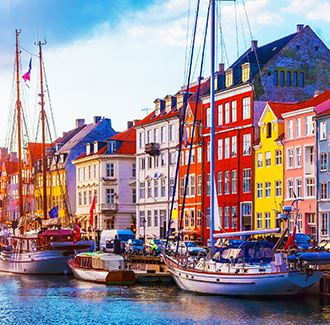
By Bicycle in Copenhagen - from one bridge to the other (waterfront living zig zag)
I always remember Copenhagen for its coves and water channels.
Exploring the various neighborhoods, each with its own peculiarities, the city emerges in its liveliness and relationship with the sea, its buildings with different architectures, and the more than 400 km of tracks and bike paths.
To discover Copenhagen in all its intricacies, I advise you to use one of the many bicycles available through the city, the installation of a simple application away.
A proposal I make is to travel along the bridges and paths on the banks of the main canal, starting our trip through one of the most vibrant and recent residential districts - Ørestad.
Walking along the main avenue of this neighborhood, in the south-north direction, we wander along paths among some of the most innovative housing buildings, designed to promote interaction between the community and the surrounding environment, some of them idealized by one of the most well-known studios of Danish architecture - the Bjarke Ingels Group (BIG).
A first stop for breakfast at the 8 Tallet Café and Restaurant, part of the 8 House, building located at the end of the neighborhood, overlooking the nature reserve.
Afterwards, we also enjoy the VM Mountain and VM House, as well as Ørestad Street Hall, the area's architectural landmarks.

Illustration made by Catarina Barbosa
On the way, we make a turn over the snake-shaped water, crossing, the Cykelslangen Bridge (The Bicycle Snake) to the opposite side, towards the center. On the one hand, we take a dip in the harbor in Islands Brygge Harbour Bath, and on the other side of the shore we stop to enjoy an extended set of exhibits at the Danish Architecture Center (DAC), or to read a book on the Royal Danish Library, The Black Diamond.
Contemplating the water, located in the BLOX (a meeting and interaction space of people with architecture, design and sustainable urban development), the DAC encompasses the world of architecture with design, suggesting exhibitions, events and conversations.
Continuing the path, zigzagging the banks of the main canal, we cross the Lille Langebro bridge, as an integral part of the BLOX project, until the known area of Christianshavn, described in the city manuals for its unique atmosphere, inviting for a deeper exploration, in communion with nature.


From Christianshavn, we go along the Cirkelbroen (The Circle Bridge), a bridge with a unique design, designed by the Danish-Icelandic artist Olafur Eliasson. With its circular routes, it invites us to have break to observe the surrounding environment. After a break, we set out for a brief exploration of the historic center, Nyhavn and all its corners, which provide us with distinct cultural experiences, also with the best cafés and restaurants, as well as shops dedicated to Nordic design, such as Hay House, Illums Bolighus or the Arhoj Studio.
Turning to the inner city, it is worth cycling towards the multicultural district of Nørrebro, through Dronning Louise's Bro (Queen Louise's Bridge), the busiest cycling street in the world, which connects the center of Copenhagen to this area. Known as the most diverse district of the Danish capital on a cultural level, there are several moments of creativity and culture.
Here, we head to an urban open space, the Superkilen Park, which is divided into 3 zones (Red Square, Black Market and Green Park). Consisting of numerous paths and pedestrian and bicycle lines, each area survives by itself as an integral part of the community that surrounds it, with cafés, music and sports; fountains and leisure areas; picnics and animal walks, from different parts of the world. Another BIG atelier project.

Since it is getting later in the afternoon, we must continue the trail back to the center, towards Ofelia Plads, to enjoy the available events, namely concerts and exhibitions near the port.
To finish this route, we head to one last bridge - Inderhavnsbroen (The Inner Harbour Bridge), which connects us by water to two of the waterfront living areas, Christianshavn and Holmen, which we cross towards our last destination, the Refshaleøen neighborhood.
Here we can assimilate countless experiences, from contemporary art exhibitions and saunas to the latest ski track, unmatched by its scale and program, built on top of the new waste treatment plant, CopenHill or Amager Bakke. In addition, there is also the opportunity to have some coffee at the top of the center or climb the largest climbing wall in the world, 85 meters high.
Here, we end the day at the urban playground for creativity, innovation and organic food, Reffen Copenhagen Street Food, the largest street food site in the Nordic countries and a symbol of a growing sustainable culture.
Useful links: Bike rental and Guide
By Catarina Barbosa, TAP Cabin Crew member since 2017.
Catarina is not only a TAP Cabin Crew, but also an illustrator and Visual Designer.


